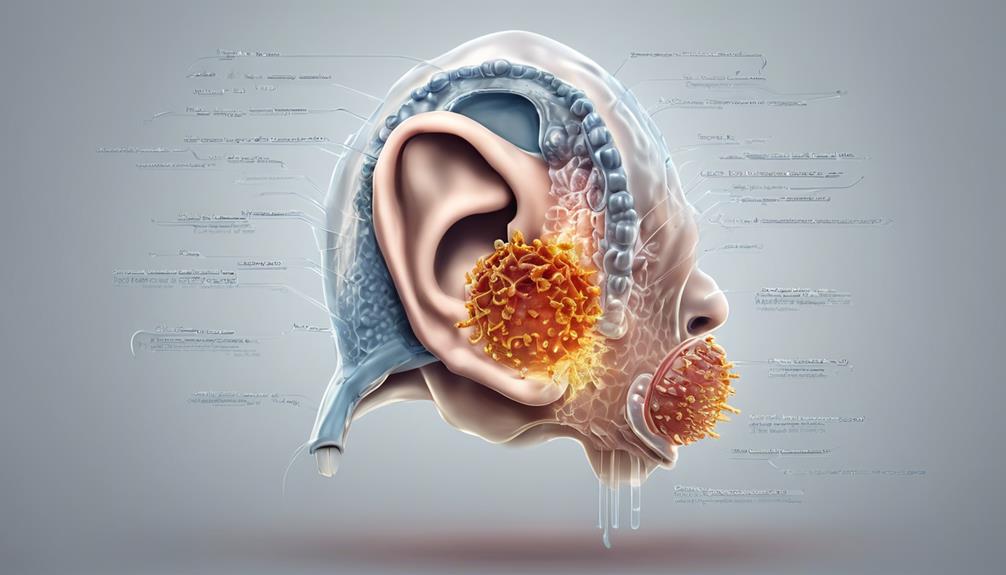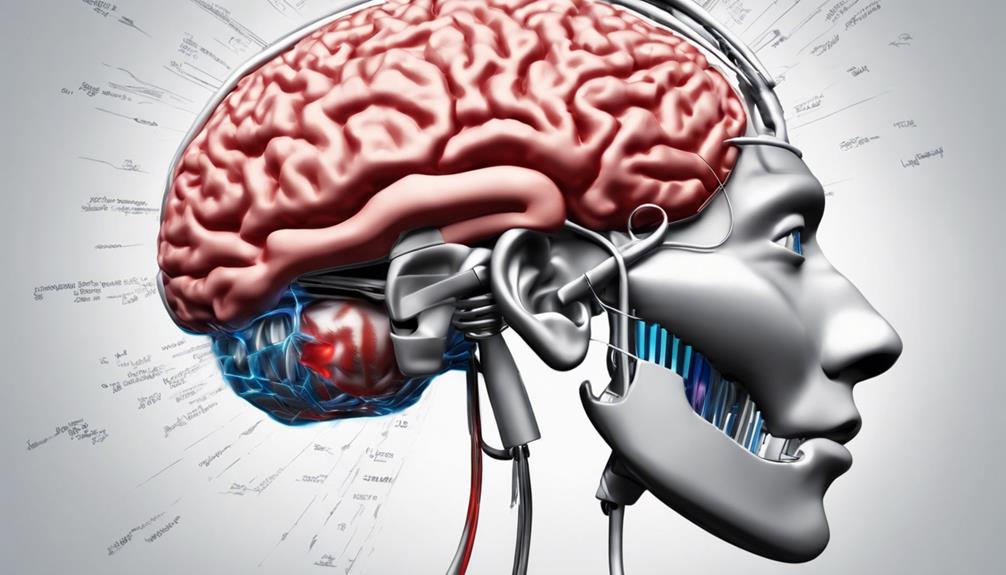As we explore the complex world of viral-induced hearing loss, it’s like solving a puzzle with pieces that are always changing and developing. Picture a faint whisper getting softer, a gentle hint of the intricate connection between viruses and hearing function.
Yet, within this enigmatic realm lies a profound understanding waiting to be unraveled, offering insights into the nuances of how viruses can influence our hearing. Join us as we explore the intricate web of viral mechanisms that intertwine with our auditory system, shedding light on the unseen forces that shape our ability to perceive sound.
Key Takeaways
- Viruses invade inner ear, leading to sensorineural hearing loss.
- Reactivation of latent viruses can trigger sudden hearing loss.
- Immune responses may cause inner ear damage, impacting hearing.
- Vaccination and early treatment crucial to prevent viral-induced hearing loss.
Mechanisms of Viral-Induced Hearing Loss
Viral-induced hearing loss occurs through various mechanisms involving direct invasion of the inner ear by specific viruses like mumps and herpes simplex virus. These viruses can directly damage the delicate structures of the inner ear, leading to sensorineural hearing loss. Furthermore, the reactivation of latent viruses such as Varicella zoster virus can trigger sudden sensorineural hearing loss by infecting the auditory nerves.
The immune response also plays a critical role in the mechanisms of viral-induced hearing loss. Immune-mediated vasculitis-like syndrome and abnormal cellular stress responses can contribute to inner ear damage. Activation of the innate immune system within the cochlea can lead to autoimmune disorders, where the immune system mistakenly attacks the inner ear tissues, producing pathogenic autoantibodies that further exacerbate hearing loss.
Understanding these intricate mechanisms helps shed light on how viruses can impact hearing and how the immune system's response can sometimes lead to detrimental effects on the inner ear.
Common Viruses Impacting Hearing

How do common viruses impact hearing, especially in vulnerable populations like young children and pregnant women?
Cytomegalovirus (CMV) is a significant contributor to hearing loss in very young children, accounting for about 40% of cases. German Measles or Rubella is known to cause severe hearing loss in infants. Herpes family viruses such as HSV 1 & 2 can result in congenital hearing loss. Although rare, the Lymphocytic Choriomeningitis Virus (LCMV) is associated with hearing loss.
Pregnant mothers with viral infections are at risk of passing on harmful effects to their unborn babies, including hearing loss. These viruses can have detrimental effects on the auditory system of infants and young children, highlighting the importance of understanding and addressing viral impacts on hearing health in these vulnerable populations.
Early detection and management of these viral infections are crucial to prevent or minimize the potential harm they can cause to the hearing abilities of children.
Detection and Management Strategies
To effectively address viral-induced hearing loss, early detection and prompt management are essential through comprehensive hearing tests. These tests, which assess the functionality of the auditory system, can aid in identifying the specific viral cause and the extent of damage incurred.
Once diagnosed, management strategies for viral-induced hearing loss may involve a multi-faceted approach. This can include the use of antiviral therapies to combat the viral infection, corticosteroids to reduce inflammation, and oxygen therapies to improve oxygenation of the auditory system tissues.
In cases where viral-induced hearing loss occurs in pregnant women, close monitoring is crucial to prevent congenital hearing loss in newborns. Timely intervention and treatment are vital as they can prevent irreversible damage to the auditory system.
Prevention of Viral-Induced Hearing Loss

Early detection and prompt management of viral-induced hearing loss are crucial in preventing long-term consequences, making prevention strategies, such as full vaccination against specific viruses, essential.
To effectively prevent viral-induced hearing loss, consider the following:
- Full Vaccination: Ensure timely vaccination against viruses like Rubella, CMV, and Varicella Zoster Virus to reduce the risk of developing hearing loss.
- Immediate Treatment: Seek immediate medical attention for sudden hearing loss to potentially reverse the condition and prevent further damage.
- Antiviral Therapy: Consider antiviral therapy as a treatment option for sudden hearing loss caused by viral infections to improve outcomes.
- Early Administration: Early initiation of treatment for viral-induced hearing loss can lead to better results and potentially prevent long-term consequences.
Treatment Options for Hearing Loss
Antiviral therapies present effective treatment options for virus-associated hearing loss, although caution is warranted due to potential ototoxic side effects of certain medications.
Corticosteroids play a crucial role in managing hearing loss caused by viruses such as Varicella Zoster Virus by reducing inflammation and immune responses.
Oxygen therapies can aid in restoring hearing in cases of virus-induced oxygen depletion, thus improving auditory function.
It's important to note that some viral infections may result in permanent hearing loss, while others may exhibit spontaneous recovery with appropriate treatment interventions.
Vaccinating young women against viruses like rubella can prevent congenital conditions that may lead to hearing loss in newborns.
Frequently Asked Questions
How Do Viruses Cause Hearing Loss?
Viruses cause hearing loss by directly damaging inner ear structures like the cochlea and auditory nerve. They can trigger an immune response leading to inflammation and damage. Some viruses can establish latent infections and reactivate, causing ongoing harm.
The mechanisms vary, including viral replication and cytotoxic effects. Autoimmune reactions in the inner ear can also be induced. Overall, viruses impact hearing by disrupting normal cellular functions in the auditory system.
Is Cookie Bite Hearing Loss a Disability?
Cookie bite hearing loss isn't always classified as a disability; rather, it depends on the severity and impact on daily functioning. While it can hinder communication abilities in noisy settings due to specific frequency range issues, it may not meet the criteria for disability status.
Management strategies for this type of hearing loss may differ from other forms, reflecting the unique challenges it presents.
Can a Viral Infection Affect Your Ears?
Yes, viral infections can indeed affect our ears. Certain viruses like CMV, Rubella, and HSV have been linked to both congenital and acquired hearing loss. These infections can damage inner ear structures, auditory nerves, or blood vessels, leading to impaired hearing function.
Prompt treatment of viral infections that impact the ears is crucial to prevent irreversible hearing loss. Regular vaccination against such viruses is key to protecting our ear health.
Did COVID Cause Hearing Loss?
We've delved into the link between COVID-19 and hearing loss. Research suggests that the virus may trigger sudden sensorineural hearing loss due to factors like inflammation and vascular complications.
Reports indicate that individuals recovering from COVID-19 have experienced hearing issues. Understanding the prevalence and long-term effects of COVID-induced hearing loss is ongoing.
Swift assessment and treatment of any hearing changes post-COVID are vital for optimal recovery.
Can Congestion Lead to Viral Infections That Cause Hearing Loss?
Experiencing congestion and hearing loss link can be concerning, especially when dealing with viral infections. Viruses like the flu and COVID-19 can lead to congestion, ear infections, and potentially permanent hearing loss if left untreated. It’s important to seek medical attention if you notice any changes in your hearing during times of illness.
Can Sinus Issues Lead to the Same Type of Hearing Loss as Viral Infections?
Yes, sinus issues and hearing loss can be connected. Sinus congestion can lead to ear pressure, affecting hearing. Viral infections can also cause inflammation in the nasal passages, impacting the Eustachian tube and leading to hearing issues. Seeking treatment for sinus issues can help prevent related hearing loss.
Conclusion
In conclusion, the intricate web of viral-induced hearing loss is a formidable foe that requires vigilant monitoring and decisive action.
The relentless assault of viruses on our delicate auditory system can swiftly transform a symphony of sounds into a deafening silence.
With swift detection, strategic management, and proactive prevention measures, we can stand strong against the stealthy invaders that seek to rob us of the precious gift of hearing.
Stay alert, stay informed, and protect your ears at all costs.










